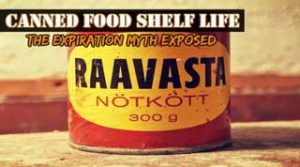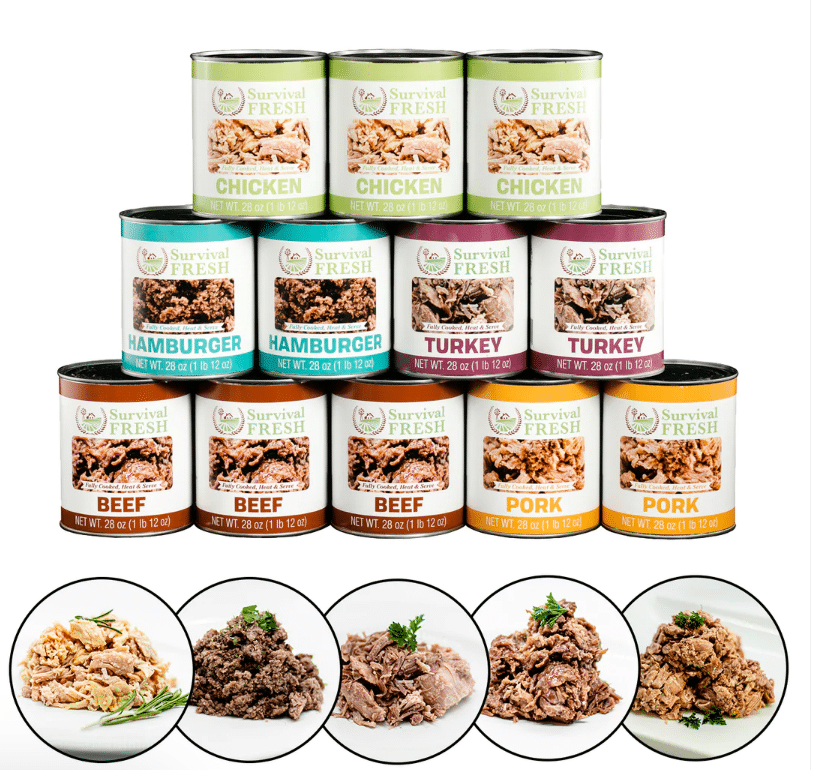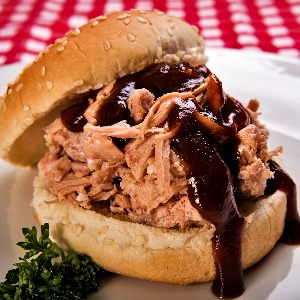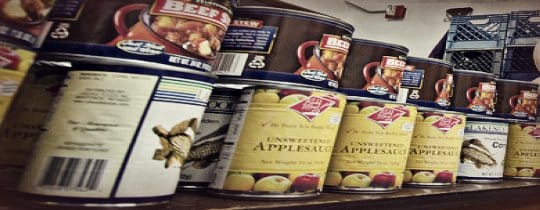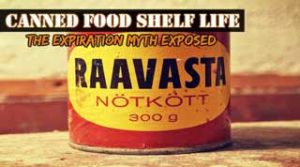
And Then Bad The Next?
Are you getting ready to throw out that can of green beans just because it’s a week past its “best by” date?
Maybe you should.
Why chance eating something that could make you sick? If the label says it’s past its prime then IT’S EXPIRED. Right?
In normal times, that’s fine. I won’t challenge that logic. It’s hard to argue that taking the extra risk worth it if the only upside will only amount to saving a couple of dollars. I’m right there with ya.
But what about when times are not normal? Would you be so quick to toss your “expired” can of green beans if calories were as scarce as water in a desert?
After SHTF, those “best by” date guidelines won’t matter. Trust me, extreme hunger will blur those lines.
What if that can of “past its prime” green beans was the only food you came across for 3 days. What if that same can of green beans meant food for your starving family?
You’ll still toss that green bean can in the trash, but it will be entirely empty of all its delicious contents. You will eat it and it will taste amazing.
And what about the chance of getting sick? There’s still that risk, but depending upon several factors, that risk is way overstated.
So today I’m going to cover the following topics in detail, specifically:
- Are “Best By” Dates An Exact Science?
- Proof Of LONGER Shelf Life From The Past
- Carefully Check Expiration Dates At The Time Of Purchase
- The Longest Shelf Life Canned Foods On The Market Today
- Best Canned Goods Storage Tips
- Are Canned Goods Still Safe Past Expiration Dates?
- The Bottom Line On The Food Expiration Date Myth
Note: Feel free to skip ahead to the sections you are most interested in using the navigation links above.
As A Way To Introduce You To Skilled Survival, We’re Giving Away Our #78 Item Complete Prepper Checklist. Click Here To Get Your FREE Copy Of It.
Are “Best By” Dates An Exact Science?
The simple answer is NO. How can they be?
There are too many variables outside of a food manufacturer’s control to come up with a reliable expiration date science.
The 2 main variables that affect canned food’s storage shelf life are:
1. Temperature Exposure
Extremely high temperatures will compromise most foods. Unless you are turning grapes into raisins or actually cooking your food for consumption, you don’t want to store canned goods in high-heat environments.
What’s worse is large temperature variations. Food left in high temperatures, then low temperatures, and then back to high temperatures, its shelf life will be compromised.
Unheated, uninsulated garages or attics = terrible storage locations.
2. Can integrity
The second variable to watch out for is can damage. If a can was dropped, crushed, or dented in any way then the integrity of the can comes into question. Damaged cans may have seal issues.
If a can is damaged then the odds go up significantly of air penetrating the can. Organic matter (food) exposed to air will tend to mold. Moldy food is bad and can make you sick.
Of these two variables, the food manufacturer can only really control the second one. And only before it ships. Once it’s shipped from the canning factory, they no longer control this variable either.
For instance:
- A forklift could puncture the can during loading.
- Shifting pallets often crush the cans on trailers in traffic.
- A 17-year-old stock boy could accidentally drop it when distracted by a cute girl from his class saying “Hi”.
- Your toddler might decide to toss it out of your grocery cart, just for fun.
These are variables that food manufacturers have no way to control.
So if you were in the same shoes as the food manufacturer and you’d be held responsible (i.e. sued) for someone getting sick on your food after the “best by” date, would you choose a conservative or liberal label date?
Would you err on the side of a shorter date? Or would you err on the side of a longer one?
Yeah, exactly, you would err heavily on the side of a shorter date. The shorter the better.
Plus, by erring on the side of a shorter date the food manufacturers are helping to sell more.
That’s the definition of a Win/Win (for them).
How’s that? If people follow their “expiration” dates and those dates are short (a couple of years) then people will either:
1. Consume the product faster
OR
2. Toss out the old stuff and buy new
Either way, it will equal more sales of their product.
Let’s imagine someone purchases their canned food product and the label said it was good for 20 years. A lot of people would let that sit on their shelves for a very long time. If enough people did that, then the food manufacturers are hurting their repeat sales volumes.
Another clue that canned food shelf life dates are arbitrary suggestions is that they now don’t even say “Expiration Date”.
Nowadays the majority of canned food stamps have “Best By” or “Best If Used By” labels on them.
This is a dead giveaway of the canned food expiration date hoax.
Of course, fresher food is always better. No one is arguing that fact. However, not being “best” and not being consumable are miles apart.
As A Way To Introduce You To Skilled Survival, We’re Giving Away Our Family First Food Planning Guide. Click Here To Get Your FREE Copy Of It.
Proof Of Longer Shelf Lives From The Past
Did you know that the excavation of canned goods over 100 years old, proved to be completely safe to eat?
In 1865, a steamboat loaded with canned provisions left port for the mining camps in Montana. Unfortunately, it had too many provisions and the weight of the vessel caused it to sink early on in its journey.
It sat at the bottom of the Missouri River for nearly a century. Among the provisions were cans of plum tomatoes, mixed vegetables, peaches, oysters, and honey.
In 1974, several scientists at the NFPA checked the content of the cans. They found that the products still had significant nutritional value and zero microbial growth.
In fact, the chemists found that these canned goods were just as safe to eat in 1974 as they were to eat 100 years earlier.
OK so now you know expiration dates are essentially meaningless when it comes to canned food. Does that mean canned food can never go bad? No…they definitely can.
You must learn how to tell the difference between canned foods that are safe to consume and those that are not.
As A Way To Introduce You To Skilled Survival, We’re Giving Away Our Family First Food Planning Guide. Click Here To Get Your FREE Copy Of It.
Check Expiration Dates At The Time Of Purchase
If you’re stockpiling food for SHTF, then it is important to know which canned foods give you the most bang for your buck.
If you are going to invest in canned goods then it is best to check the “best by” dates when purchasing. As you might with a loaf of bread or gallon of milk.
Choose the cans from the back of the grocery store shelves that have the very furthest out “best by” dates.
This doesn’t mean that you have to discard them the day they expire. It’s just selecting the newest and freshest produce available at that time of purchase.
As A Way To Introduce You To Skilled Survival, We’re Giving Away Our #78 Item Complete Prepper Checklist. Click Here To Get Your FREE Copy Of It.
Best Canned Foods On The Market Today
In the canned food category, canned meat tends to last the longest. Meats such as beef stew, Spam, tuna fish, etc. tend to have quite long shelf lives.
For example, these All-Natural Mixed Canned Meats By Survival Fresh have a 25-year shelf-life!
If you want to stock high-quality canned meat for your emergency supplies with a single order – look no further than these deals from Survival Fresh!
First off, these canned meats are delicious.
Just check out some of these reviews – they speak for themselves. Preppers, campers, and meat lovers have rated them the “best survival food” time and time again.
The bottom line is: This ain’t your father’s can of Spam!
Not only does it taste great but Survival Fresh meats have an ultra-long shelf-life of 25 years! This gives you the confidence to buy in bulk and store them away in your survival pantry.
But how does Survival Fresh Canned Meat last so much longer than any you’d pick up at the grocery store?
The Survival Fresh Meat is first sealed uncooked into the cans, then its sealed and slow-pressure cooked. This provides a much longer shelf life.
Grocery store cans of meat are lucky to have an 18-month expiration date. And they’re often loaded with fillers, preservatives, and growth hormones.
Only with Survival Fresh Meats can you enjoy all-natural healthy protein with a shelf life of 25 years.
But remember canned food shelf life has as much to do with how you store it, as with which foods you choose to buy.
For example, you can significantly increase the canned food shelf life of soup or canned bread by storing it correctly.
As A Way To Introduce You To Skilled Survival, We’re Giving Away Our Family First Food Planning Guide. Click Here To Get Your FREE Copy Of It.
Best Canned Goods Storage Tips
To prolong your canned food shelf life, focus on good canned food storage techniques. Keeping any food fresh past its typical shelf life depends on the conditions in which you keep these emergency food items stored.
1. To begin with, never buy dented cans.
Sure, many people say there is no issue buying cans with dents. This is true if consumed quickly but if you’re stockpiling food goods, a dented can is a liability.
Don’t settle for cans or jars lids that have even minor damage. Cans with damage will lead to premature bacterial growth over time. This is often more important than the expiration dates label.
2. Canned food shelf life can be significantly affected by moisture.
You want to control the humidity in your storage environment.
Dry foods can pick up moisture that can lead to mold and bacterial growth. Moisture can also lead to the breakdown of packaging containers, such as aluminum or tin cans.
As these containers oxidize and rust, they can affect the canned food shelf life.
3. Mid-range temperatures are best to improve canned goods’ shelf life.
Shoot for temperatures ranging from about 40 to 70 degrees Fahrenheit.
A study conducted by Brigham Young on wheat over the long term showed that wheat kept in cool storage, such as a basement, would be edible for years.
Wheat stored in a hot environment such as an attic would only be acceptable for consumption for five years.
On the flip side, canned food shelf life can be significantly decreased if items become frozen even if just for a short period.
4. The shelf life of canned food can also be negatively affected by direct sunlight.
While you may enjoy laying in the sun and baking, your canned goods won’t take very kindly to this process. The heat from direct sunlight will speed up the deterioration of the cans and the contents as well.
Want a Downloadable and Printable Version Of This Prepper’s Checklist? Click Here To Get Your FREE Copy Of It.
Are CAnned Goods Safe To Eat After Expiration?
Canned food expiration dates don’t mean you have to throw the food out. Yet they can serve as a guideline to help you rotate your usage of these products.
They can also serve to let you know which products last longer than others. Using them simply as a reference can be helpful, as long as they are not taken too seriously.
You will not die if your green beans are a month or even a year past their expiration date if you are storing your canned goods properly to ensure that these foods last as long as possible.
But how do you know if the canned goods on your shelf are still safe to consume years past the expiration date?
There are some tell-tale signs if the shelf life of your canned food has truly passed.
The following are some signs that the food in those cans may become contaminated.
1. Don’t just look at the expiration dates on canned food.
Look at the cans themselves. Do they have dents or rust, or are they bulging?
These are signs that the food items contained in them have become compromised.
Also, the shelf life of canned food can be compromised in jars that have signs of corrosion on the lid and liquid seeping under the lid of the jar.
You should discard jars with this appearance.
2. The nose really does know.
A bad smell is a helpful indicator of rotten food. So if you’re uncertain about the shelf life of canned soup, for instance, simply open it up and take a big whiff.
A bad odor will serve as a good indicator and will let you know in most cases if the contents of the can are bad.
3. A few more signs to look out for.
Discoloration. Although by itself this might not be anything to fear, with any other signs of contamination present, it’s best to discard this food.
Don’t consume eggs that float in water.
Also, any can or jar that spurts liquid upon opening is a good sign that the food is bad.
Mold is another indicator that the food has spoiled.
As A Way To Introduce You To Skilled Survival, We’re Giving Away Our Family First Food Planning Guide. Click Here To Get Your FREE Copy Of It.
Final Thoughts On The Food Expiration Date Myth
It is important to realize that the dates on canned goods simply don’t matter.
What really matters is what is in the can. If you store canned goods in ideal conditions and take good care of them, they can live well past the expiration on the can.
So when you ask yourself, “what is the shelf life of canned food?”
Keep in mind that the food is fine to eat for years to come. Using some basic common sense tips can go a long way in helping to feed your family through tough times.
If you have concerns about the quality of the contents of a can of food you are about to consume then err on the side of caution.
It’s better to be safe than sorry.
But don’t hesitate to use your five senses to assess the shelf life of canned food. This is a better way to tell if canned foods are still safe to eat than any arbitrary date printed on the packaging.
P.s. Are you ready for the tough times ahead?
Find out now by taking my short Readiness Score Quiz – it’s absolutely free.
Once complete, you’ll know exactly where you stand on the “fragile” vs.” resilient” spectrum.
So click here to start the Quiz….And don’t worry; the questions are so easy a 3rd grader could answer them.
Click on the image to begin the Quiz and find out once and for all if you’re part of “The Fragile Masses” or “The Resilient Few.”
Photo Credits: Top / Ruler / Ship Wreck / Date / Cans
The post Canned Food Shelf Life: Read Before You Toss appeared first on Skilled Survival.


